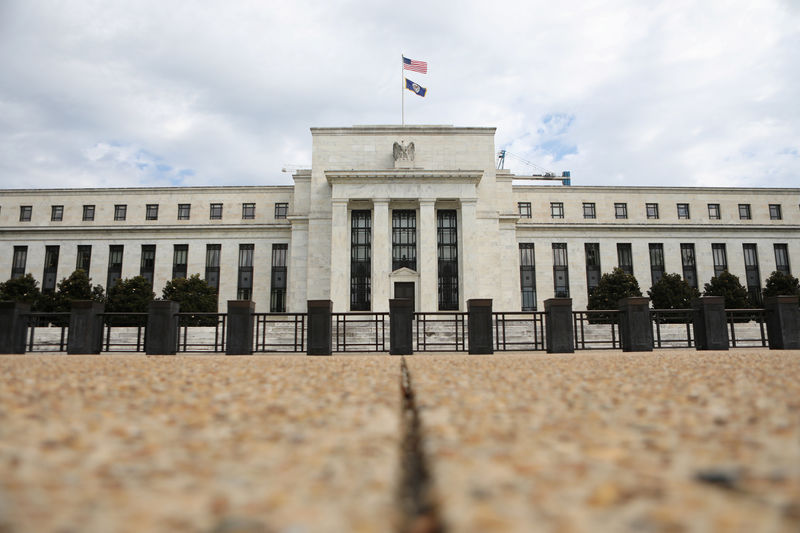By Noreen Burke
Investing.com - The Federal Reserve meets on Wednesday for the final time before the Nov. 3 presidential election with investors hoping to learn more about its decision to tolerate higher inflation. Markets will also be paying close attention to data on U.S. retail sales for August, out on Wednesday and initial jobless claims figures a day later. Last week’s volatility in stocks could continue with a much-awaited fiscal aid package stalled in the Senate and the election looming. In the UK, the government is to begin debating its controversial internal markets bill which could wreck its EU divorce treaty. Meanwhile, the Bank of England and the Bank of Japan will both hold policy meetings just hours after the Fed on Thursday. Here is what you need to know to start your week.
- Fed meeting
The Fed, which wraps up its two-day policy meeting on Wednesday, is expected to make some minor adjustments to the language in its rate statement after it adopted a new approach last month to meeting its 2% inflation target. The Fed’s decision to tolerate periods of higher inflation effectively means that interest rates will remain lower for longer.
The Fed will also update its projections for the economic and interest rate outlook, known as the dot plot, which will include forecasts for 2023 for the first time.
"I think the 2023 dots will be the ones everybody’s staring at,” said Jon Hill, an interest rate strategist at BMO Capital Markets.
Fed Chair Jerome Powell said earlier this month that while the central bank will keep its foot on the monetary policy gas, lawmakers also need to help with recovery relief, making the absence of a new fiscal policy package an increasingly worrying development for some investors.
- Retail sales, jobless claims in focus
Ahead of the Fed announcement on Wednesday the U.S. is to release data on retail sales for August. The consensus forecast is for an increase of 1% month-over-month and the data will give an important insight into whether the expiration of enhanced unemployment benefits at the end of July hit consumer spending.
Market participants will also be watching Thursday’s data on initial jobless claims. The number of new claims for unemployment benefits hovered at elevated levels last week, suggesting the labor market recovery from the COVID-19 pandemic was stalling as government financial aid to businesses and the unemployed dries up.
- Stock market volatility may continue
Some investors are worried that last week’s stock market volatility - which knocked the Nasdaq down as much as 10% from its highs and rocked other indexes - is the start of a larger sell-off that will throw the market off its course after a six-month rally.
But other investors view the recent slump as a healthy consolidation after a stunning five-month rally in the S&P 500 that was powered by a small group of heavyweight tech companies and massive amounts of fiscal and monetary stimulus.
Analysts at Bank of America Global Research have noted that September tends to be the weakest month of the year, with stocks notching gains less than half the time and the S&P 500’s average return at minus 1%.
The bank’s data also shows that markets tend to dip in the weeks ahead of an election, then rallying after.
- Brexit fireworks
The British government is to begin debating the internal market bill on Monday and while Prime Minister Boris Johnson has an 80-seat majority, internal discontent over the bill could test his leadership.
The move to table a bill that would breach the existing withdrawal agreement, which London openly admits would contravene international law, could sink the chances of a post-Brexit trade agreement, and trigger legal action by the European Union.
Analysts at Morgan Stanley have increased the likelihood of Britain and the EU ending up trading on World Trade Organization terms to 40% from 25%.
"The risks are skewed to a harder outcome... bumping up the probability of our bear case of a WTO-style outcome to 40%. We still expect a delay in implementing the deal," the bank’s analysts said, in a note.
Sterling has already lost 4% this month and at $1.28, the full risk may still not be priced in.
- Central banks
The Fed shift to tolerate higher inflation, effectively a pledge to keep policy loose, puts other central banks in tough spot. Unless they follow suit, the effects of the weaker dollar against their currencies could threaten their economic recovery and their inflation outlooks.
Last week the European Central Bank said the stronger euro is not yet a concern. But it, along with its peers in the UK and Japan, which meet this week, could eventually be forced down the Fed's looser-for-longer route.
No policy changes are expected from the Bank of Japan or the Bank of England. But the BoE may flag extending its bond-buying to help an economy battered by the effects of the pandemic and Brexit.
The BoJ meanwhile must contend with an incoming new prime minister, likely Yoshihide Suga, who recently called for the bank to work with the government, saying he didn't buy arguments about negative rates hitting bank profits.
--Reuters contributed to this report
